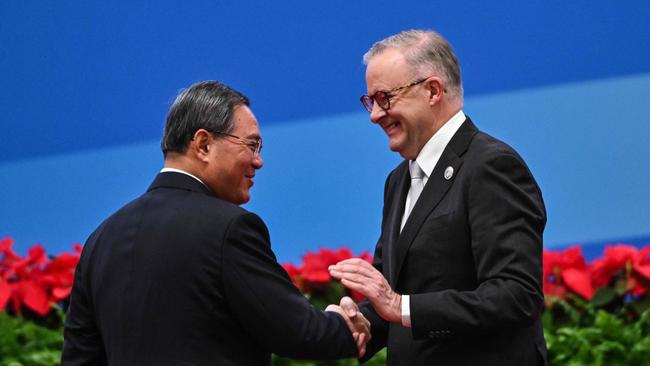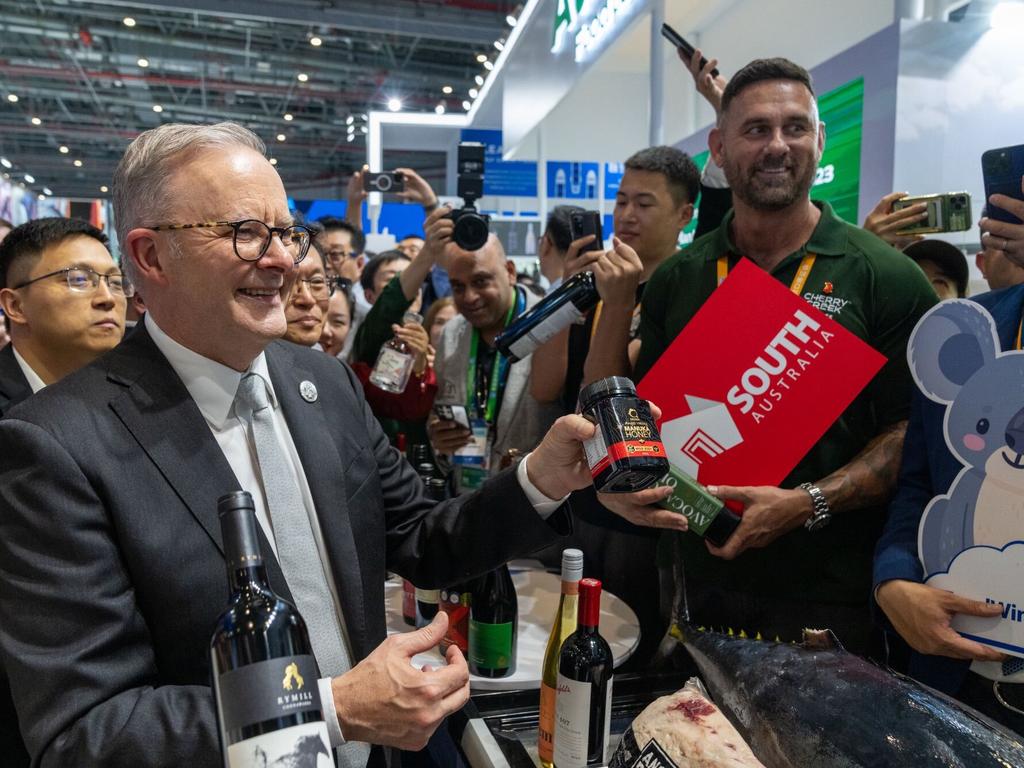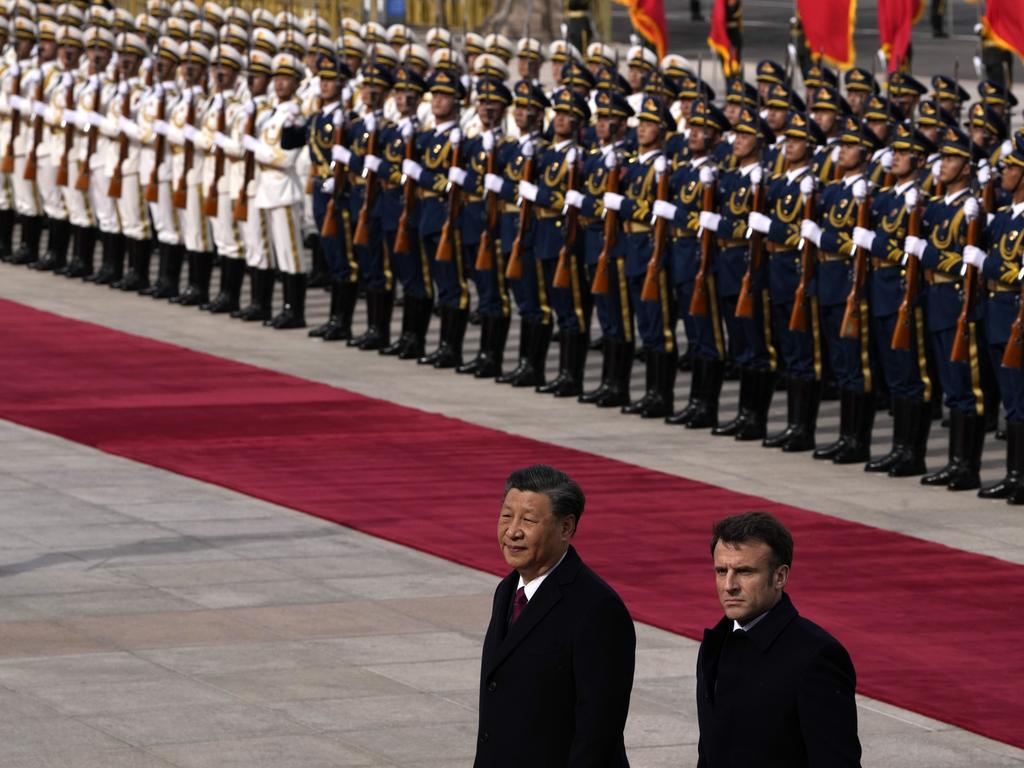Albanese leaves door open for China to join trans-Pacific trade pact
Anthony Albanese has left the door open a day ahead of his meeting with Xi Jinping to China’s future membership of the trans-Pacific trade pact.

Anthony Albanese has left the door open a day ahead of his meeting with Xi Jinping to China’s future membership of the trans-Pacific trade pact, but warned it must demonstrate the highest possible trade standards if it wants to join the 11-nation bloc.
The move in Shanghai came as Chinese Premier Li Qiang sharpened Beijing’s pitch to become a member of the pact, rejecting protectionism and vowing to “promote international consensus and rules”.
As the stabilisation of the nations’ relationship continues, the government said there were “positive signs” China’s remaining trade bans against Australian exports would be lifted soon.
Speaking on the first day of his landmark trip to the country – the first by an Australian prime minister in almost seven years – Mr Albanese said “rules-based trade” was vitally important, and underlined Australia’s support for the World Trade Organisation.
His comments, to China’s biggest trade show, came three years after China slapped punishing trade bans on $20bn worth of Australian exports amid a plunge in relations between the countries.
Opening the China International Import Expo, Mr Li declared China would “actively pursue” accession to the Comprehensive and Progressive Agreement for trans-Pacific Partnership – a bid that Australia and Japan have so far opposed.
As China backs away from its remaining sanctions on Australian wine, lobster and red meat, the No. 2 Chinese leader said Beijing would “resolutely oppose unilateralism and protectionism”, and “uphold the authority and effectiveness of the multilateral trading system”.
Mr Albanese, who will meet President Xi in Beijing on Monday night AEDT, did not rule out China’s future membership of the CPTPP.
But he warned any new entrant faced a high bar to join the bloc, which requires unanimous consensus of members to allow new entrants.
“What we’ve said is that any country must demonstrate that it can meet the high standards of the agreement. And that is the basis of all of that going forward,” Mr Albanese said.
“And any positions that are advanced tomorrow will be advanced tomorrow, but we haven’t had those discussions yet.”
He said all applications to join the bloc, which include a bid by Taiwan, would be dealt with “in an appropriate way”.
Mr Albanese’s failure to push back more forcefully on China’s proposed entry to the CPTPP is expected to spark concerns in Tokyo, which fears, along with the US, that Beijing could use its membership to strengthen its dominance of global commerce.
Trade Minister Don Farrell, who accompanied Mr Albanese in Shanghai, said he was buoyed after raising China’s remaining trade bans on $800m-a-year worth of Australian lobster and red meat exports from a handful of abattoirs with his counterpart Chinese Wang Wentao.
“I would expect that in a very short space of time, we will find those products back into the Chinese market,” Senator Farrell said.
“When that will be I can’t tell you exactly but all of the indications last night from my meeting … was that it’s going to be a very positive outcome.”
China axed its bans on Australian barley after an Australian World Trade Organisation challenge, and is reviewing its sanctions on $1.2bn-a-year of Australian wine, with an expected return of the product to China in the new year, in return for Australia suspending another WTO case.
Mr Albanese visited Australian exporters’ stands at the expo as well as state displays by Queensland, Victoria and Tasmania, holding up a lobster, tasting wine, and eating Australian beef.
He said there were “wins to be had” for Australian businesses in China, thanks to the countries’ “mature relationship, energised by the complementary nature of our economies”.
The Prime Minister also issued an appeal for Australia to keep two pandas – Fu Ni and Wang Wang – loaned to the Adelaide Zoo in 2009 as a present to Australia by Hu Jintao. “On behalf of Australia’s kids and families, I would like to see pandas maintain a presence in Australia,” he said.
Mr Albanese used a speech to the expo to reiterate Australia’s support for “rules-based trade”, telling an audience including Mr Li that Australia “highly” valued the role of the WTO.
He said the framework of trade rules provided “certainty and opportunity for redress if problems arise”. He also pointed to Australia’s booming exports, which were largely unaffected by China’s coercive campaign against products.
“Even in this time of global uncertainty, Australia’s trade in goods and services reached a record level in 2022-23,” Mr Albanese said.
“It’s why Australia will continue to be a constructive player in global economic architecture. And it’s why we continue to highly value the World Trade Organisation, whose role as an independent and respected umpire benefits us all.”
Mr Li, who Mr Albanese will sit down with in Beijing on Tuesday, talked up China’s economy in his speech to open the expo, portraying it as an “engine room of global recovery”.
But economists outside China believe the country will struggle to reach its 5 per cent growth target amid a property sector slump, declining exports and a sharp drop in international investment.
Business Council of Australia chairman Geoff Culbert welcomed the rapidly improving relations between the countries, telling representatives of 250 Australian companies attending the expo that the green energy sector presented a prime opportunity for future co-operation.
Tourism officials are also enthusiastic about the restoration of times, which had prompted a rise in Chinese visitor numbers to Australia – up 50 per cent in August, to 128,000, compared to 58,000 the previous month.
But Jim Chalmers said Australia remained cautious given the complexities and challenges of Australia’s China relationship.
“Now, we are clear-eyed about the complexities and the challenges of managing this relationship. But we give ourselves the best chance of prospering together if we engage with one another,” the Treasurer said.
In an editorial on Sunday, the state-run Global Times said Canberra “bore the primary responsibility” for the breakdown in ties between the countries.
It said the relationship’s future would “hinge on Australia’s ability to eradicate internal and external interferences to prevent a recurrence of past mistakes”.
“It’s worth mentioning the role of the US here, as its significant influence on Australia’s policy toward China will persist in the long term,” the paper said.








To join the conversation, please log in. Don't have an account? Register
Join the conversation, you are commenting as Logout